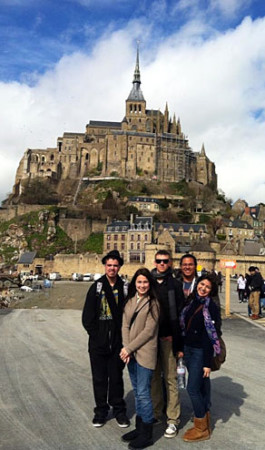

A week in Paris changes perspective
You would expect it to be like a postcard, wouldn’t you? Scenic views of the Eiffel Tower and Notre Dame all the while a cool Paris breeze hits you as the sun sets over the city. That’s what a lot of people think of when I tell them of my recent trip overseas to France. However, what people don’t realize is that going to another country is more than stereotyped images.
This was my first time ever leaving the United States, so there was a natural feeling of not knowing what to expect. But when the plane touched down at the airport, there was hardly a feeling that I was even in another country. When we first entered the city, the first sight was graffiti on buildings and a setting that was more industrial than metropolitan. That night at the Louvre museum, though, was a different story.
One of the first things to understand about the cities of Europe, especially one as old as Paris, is that nearly everything is to a bigger scale. The city itself is massive. Most of the buildings have the same distinct Paris style. At the Louvre and a day later the Palace of Versailles, I was amazed at how even something as mundane as a ceiling could be made into an enormous work of art.
We all know the popular landmarks, but it’s a whole different experience when you see them in person and in some cases ascend to the top of them. Not many people, especially the younger generations, see monuments and landmarks in America and describe them as artwork. Here, you could make the case that appreciation for history and culture runs strong.
As much as seeing these monuments can be life altering in its own right, there is more to a country than just tourist sites. Paris is as busy as any major city. And this hustle and bustle attitude can translate to some travelers as rudeness. When we went to Loches, a small town in the center of France, the atmosphere completely changed.
The personality of the villagers are much more down to earth than the inhabitants of the big city. The vibe became more traditional and quaint, and while Paris was exciting, going to smaller towns in France also served to broaden my horizons from the cultural standpoint.
Paris has many of the businesses that one would see in this country (McDonalds, Subway, Starbucks, etc.), and yet there is not an abundance of what we call fast food. Instead we have an abundance of restaurants and cafes that are frequented more than American fast food institutions. Markets are also fairly popular, with fresh fish and meat being sold to passersby.
As a matter of fact, the American influence on the country is fairly low. Small businesses make up most of the Paris sidewalks. Here these businesses seem to strive more, while stateside they are going under day by day.
These experiences I had served to give me new appreciations to culture overall. But perhaps the most important thing that I learned from this opportunity to travel is to take time to go outside of your comfort zone and experience new things. It seems as if many people choose comfort over risk. They choose to stick with something they know rather than something they’ve never encountered before. This mindset is acceptable to a point, but there come times when stepping outside of what we’re comfortable with is necessary.
I’ll admit to being guilty of this mindset in the past. I would stick to what I was most comfortable with and would be reluctant to expose myself to new things. I was one of the least experienced in my group in terms of fluently speaking the language, so naturally, I thought I would have a hard time. But even though I was at a disadvantage, I didn’t let it hinder me taking in all the sights and sounds of this new environment.
By taking a big step and leaving the country, the continent for that matter, I was able to find new perspectives and have experiences worth telling others. If anyone gets an opportunity like this and be exposed to a new culture and lifestyle, by all means go for it. Because at first I was skeptical at whether something like this could change a person. But I’m glad this one time that I was proved wrong.












